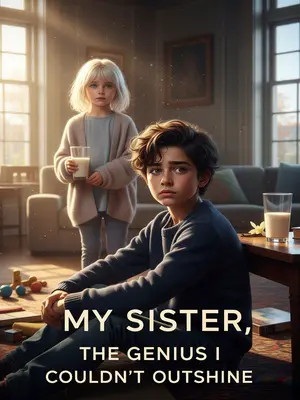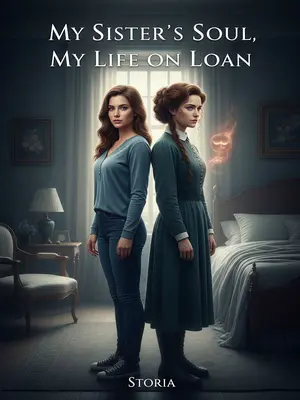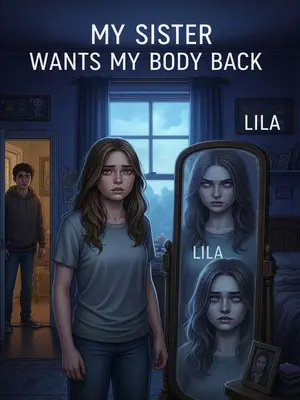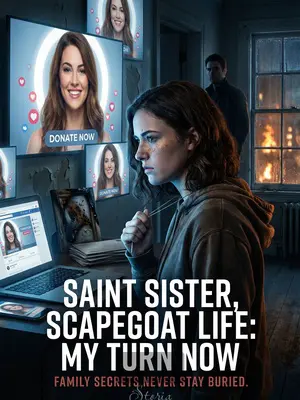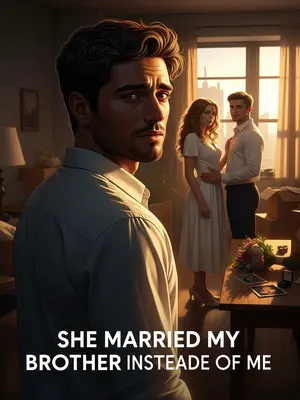Chapter 1: The Forgotten Sister
The doctor said my mom’s health was poor and she wouldn’t be able to have more kids, so my parents adopted a baby girl who’d been left at the entrance of the hospital.
That’s the story they told, anyway. Dad always said God sent us Summer for a reason, and Mom joked she’d been delivered like a package—no tracking, just a big surprise. I always pictured her bundled in a faded pink blanket outside Mercy Hospital, with a note tucked under her chin. No one ever said much about the real parents. In Ohio, sometimes folks just... disappear.
Because it was the start of summer, they named her Summer Lynn—Summer, for the season.
I always thought it was kind of poetic, though my grandma said we should’ve just called her June. Dad said Summer sounded hopeful, and hope was what our house needed.
Only half a year after adopting Summer, my parents had me.
The neighbors joked that the Lynn household must’ve found some magic in their garden. Mom said it was pure luck—or maybe God changed His mind.
They never thought they’d have a child of their own, so when I was born, they were so overjoyed they lost all sense.
I’ve seen the photos—Mom with wild hair, Dad crying in his old Cleveland Browns sweatshirt. They brought me home with balloons, cupcakes from Safeway, and a thousand phone calls to every relative in three states.
On the day I was born, the whole family forgot about Summer and left her alone at home.
I used to feel guilty about this, even though I couldn’t remember a thing. Our old house was small, with faded wallpaper and a crooked porch swing. The air smelled like cut grass and barbecue smoke in the summer, and every mailbox had a Cleveland Browns flag or a faded American flag. When they all rushed out, they just forgot—Summer, only a toddler, left behind with the TV playing static.
It wasn’t until the next day, when my dad came back to grab a pacifier for me, that he found Summer curled up on the couch, unfed for a whole day, too weak to even cry.
He told this story years later, shaking his head in the kitchen while stirring his coffee. Mom cried when she heard it. Summer just smiled that odd, distant smile of hers, like she wasn’t sure if the story was about her or someone else.
For as long as I can remember, I always heard my mom repeating to her:
"Jamie, your little brother was born weak. You need to take good care of him."
In the Midwest, we take care of our own—or so my mom always said. She’d call out this mantra even while packing lunches or folding laundry. It was as routine as grace before dinner.
"Jamie is the most important person in our family. You have to help him, okay?"
Mom’s voice was gentle but insistent, the kind of tone she used when she wanted her will obeyed without question. Sometimes she’d say it in front of her church group, as if letting the world know whose job was whose.
"You’re the oldest, Summer. That means you look out for Jamie—always. He comes first, you hear me?"
In our house, being the eldest was an endless list of chores and sacrifices. Summer listened, always nodding, her eyes steady. I never saw her protest or roll her eyes, not even once.
Summer always listened to my mom. Ever since she was little, she let me have my way, spoiled me, and took care of me in every way.
She’d cut the crusts off my sandwiches and tie my shoes, even when I insisted I was too old for it. Whenever I had nightmares, she’d sneak into my room with her favorite stuffed raccoon, placing it beside me so I wouldn’t be afraid.
I liked my sister the most when I was little. I always followed her everywhere, doing whatever she did.
If Summer played hopscotch on the driveway, I hopped beside her. When she learned to ride her pink Huffy bike, I trailed behind on my tricycle, begging her not to go too fast.
I was born in November, so Summer started elementary school a year before me. I wanted to go with her, but I wasn’t old enough. I couldn’t see her all day and cried so much I couldn’t eat.
I remember those long autumn afternoons, Mom sitting beside me at the kitchen table, coaxing me to eat SpaghettiOs. But I’d just stare at the clock, waiting for Summer’s sneakers to appear at the door.
My parents felt bad for me, so they let Summer come home from school every day at lunchtime to check on me.
It wasn’t really allowed, but Mrs. O’Brien, her teacher, lived next door and promised to keep an eye out. Sometimes Summer would rush home, a little out of breath, her backpack bouncing against her knees.
The school was far from home. Summer would get home at noon and go back at one-thirty. Sometimes, she didn’t even have time to finish her mac and cheese.
She’d wolf down two bites, wipe her mouth with her sleeve, and kiss me on the forehead before grabbing her books and running out again. I’d save a gummy bear for her, just in case.
Back then, what I looked forward to most was growing up quickly. As long as I grew up, I could go to school with Summer and see her all day long.
Sometimes I’d sit by my window, counting down the days until I could wear a backpack too, imagining us side by side in the school bus, like superheroes.
When I finally went to school and tasted how hard studying was, I realized how naïve I’d been.
Kindergarten felt like a breeze, but first grade? Math quizzes and spelling bees made me wish for nap time again. Suddenly, the world seemed a lot bigger—and a lot tougher—than I’d imagined.
But Summer never seemed to think it was hard. She was always at the top of her class.
Every time there was an assembly, Summer would come home with another gold star, another handshake from the principal. Our fridge was plastered with her awards.
When I started school, my parents made her repeat a grade so she could be in the same class as me and take care of me.
They claimed it was for my own good, but I remember hearing Grandma mutter, “Poor kid, always has to give up something.” Summer never complained—just smiled and told me it’d be fun to have a ‘twin’ at school.
I struggled to get average grades, but Summer, who never studied at home, always ranked first in our grade.
No matter how much I tried, my report card was filled with “Needs Improvement.” But Summer? Always perfect. She’d help me sound out tricky words, never bragging about her own scores.
After school, on weekends, during winter and summer breaks—whenever classmates invited Summer out to hang at the mall or go to the movies, my parents never let her go. They just made her stay home and study with me.
Even when there was a sleepover at Kelly’s house or a birthday at the roller rink, Mom would shake her head: “Family first.” Summer would just nod, grab her flashcards, and sit beside me at the dining room table.
In fifth grade, once when both my parents were out, I got bored of studying and begged her to take me out to play.
It was one of those golden October afternoons, the kind where the trees glowed like they’d been set on fire. I pouted and whined until Summer caved in, glancing nervously at the clock.
Summer hesitated for a long time, but finally nodded.
She rummaged through her backpack for a handful of change, stuffed it in her pocket, and laced up her battered sneakers. “Only for an hour, Jamie,” she said, but her eyes sparkled just a little.
She took me to a nearby mall, holding my hand, watching the older girls play on the dance arcade machine.
The place smelled like buttered popcorn and spilled soda. We stood by the flashing machines, watching the older kids move in perfect sync. Summer squeezed my hand tighter every time the music hit a high note.
I watched her feet tapping on the ground, my face full of envy.
I envied the girls who could let loose, who weren’t weighed down by little brothers or house rules. Summer bit her lip, shifting from foot to foot like she was trying to remember what fun felt like.
I urged her to give it a try.
"Don’t run off," Summer told me seriously.
She gave me her ‘big sister’ look, the one that meant business. “Stay where I can see you. Promise?”
I nodded hard.
I promised, bouncing on my heels. My hands were sweaty with excitement.
When my sister got on the machine, I realized she was really good at it.
She picked a hard song and, somehow, her feet seemed to know every step by heart. Even a few of the older kids stopped to watch. She looked weightless, like she belonged in the blinking lights.
That free, radiant smile she wore while dancing—I had never seen it at home.
She let loose in a way I’d never seen—like all the world’s rules fell away for those three minutes. I caught myself smiling too.
At home, she was always quiet and sensible, never smiling, like a little adult.
But here, she looked almost wild, laughing as the final score flashed: NEW HIGH SCORE.
Summer was happy, and so was I.
I jumped and clapped, not caring if I looked silly. In that moment, it felt like nothing else mattered.
She finished with another high score, and I ran up to cheer for her.
“Summer, you’re the best!” I shouted, probably louder than I should’ve. She grinned, cheeks flushed, hair stuck to her forehead.
At that moment, a girl on the next dance machine happened to stumble and fall off.
She crashed into the side, and in the chaos, I lost my balance.
I couldn’t dodge in time and got knocked hard to the ground.
My knees hit the rough carpet, pain shooting up my leg. My vision blurred with tears.
"Jamie!"
Summer’s voice broke through the noise, sharp and scared. People turned to look as she ran over, arms outstretched.
I heard Summer call my name, running over in a panic, her voice trembling.
She dropped to her knees beside me, panic etched on her face.
My knee was scraped over a large area, blood seeping out nonstop.
The sight of blood made my stomach twist. I whimpered, hugging my leg to my chest.
I had never been hurt this badly before, so I hugged my leg and cried so hard I couldn’t breathe.
The whole world shrunk down to pain and Summer’s hands trembling as she tried to soothe me.
Summer took me home.
She half-carried me through the parking lot, whispering apologies and promises not to tell Mom. I just cried, snot and tears running down my face.
My parents were furious when they saw my injury. They really laid into Summer and even wanted to hit her.
Dad’s voice thundered through the house. Mom started in on her, too—Summer stood there, eyes fixed on the carpet. I stood behind her, shaking.
I endured the pain in my knee and rushed out to block my dad, repeating over and over that it was my fault—I had begged my sister to take me out, and I hadn’t stood properly.
I watched Dad’s hand rise and felt my stomach drop. My knees shook, but I stood my ground, wishing I could take every hit for her.
My voice cracked as I tried to shield Summer, but Dad’s anger wouldn’t let up.
Dad still slapped my sister twice, pointing at her and saying coldly, "You two are a team. If your brother messes up, you get punished too."
His words stung worse than the slap. Summer didn’t cry. She just pressed her lips together, eyes shining with something I didn’t understand.
Summer covered her face, silent for a while, then finally nodded.
After that, the house fell silent. No one brought up the arcade again, and I nursed my bruised knee in my bedroom, feeling guilty.
From then on, I never saw Summer play the dance machine again.
She walked by the arcade at the mall without even glancing at it. Her smile from that day seemed lost somewhere between the food court and the parking lot.
I begged her to go, but she wouldn’t.
She’d shake her head, ruffle my hair, and say, “Let’s just go home, Jamie.”


